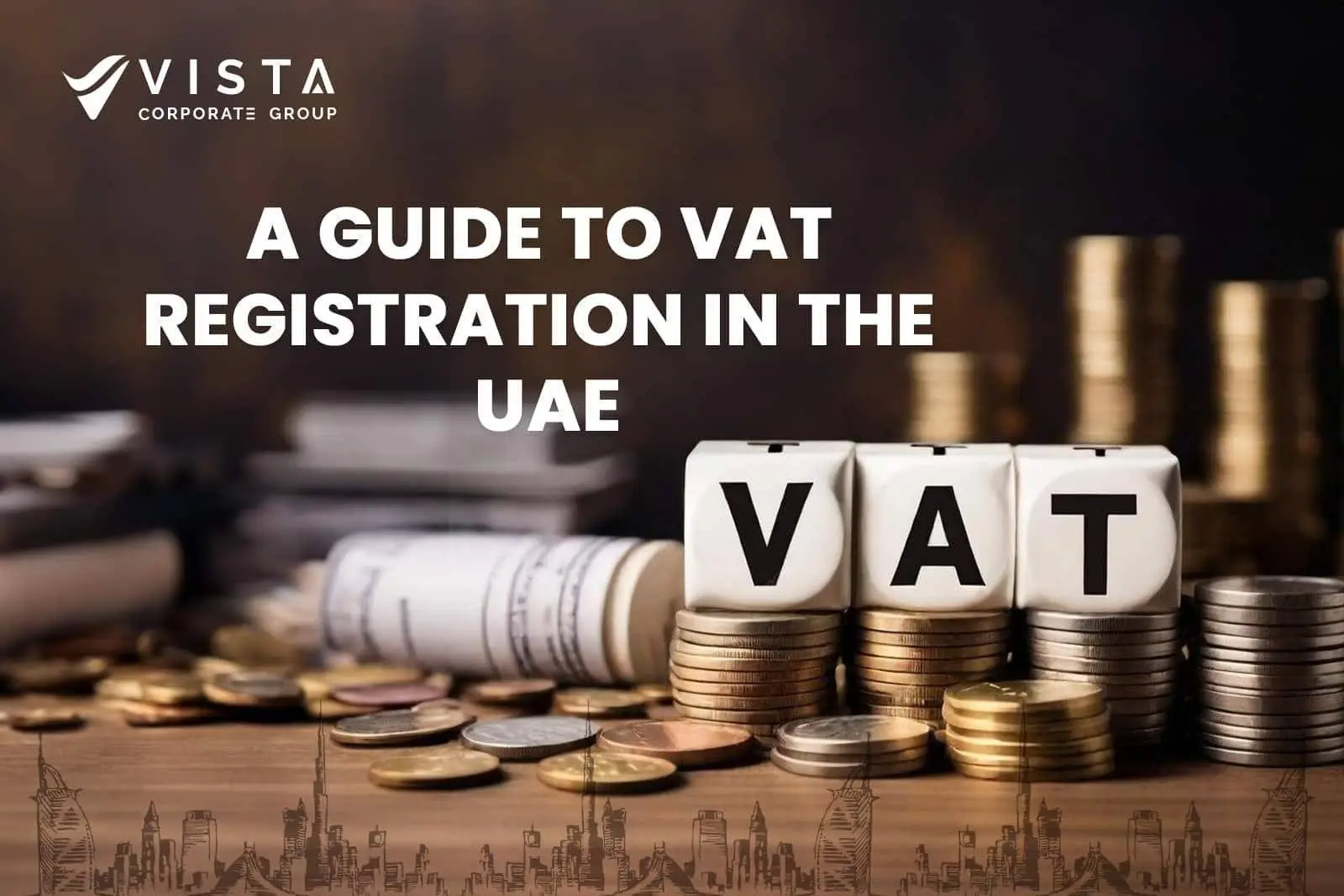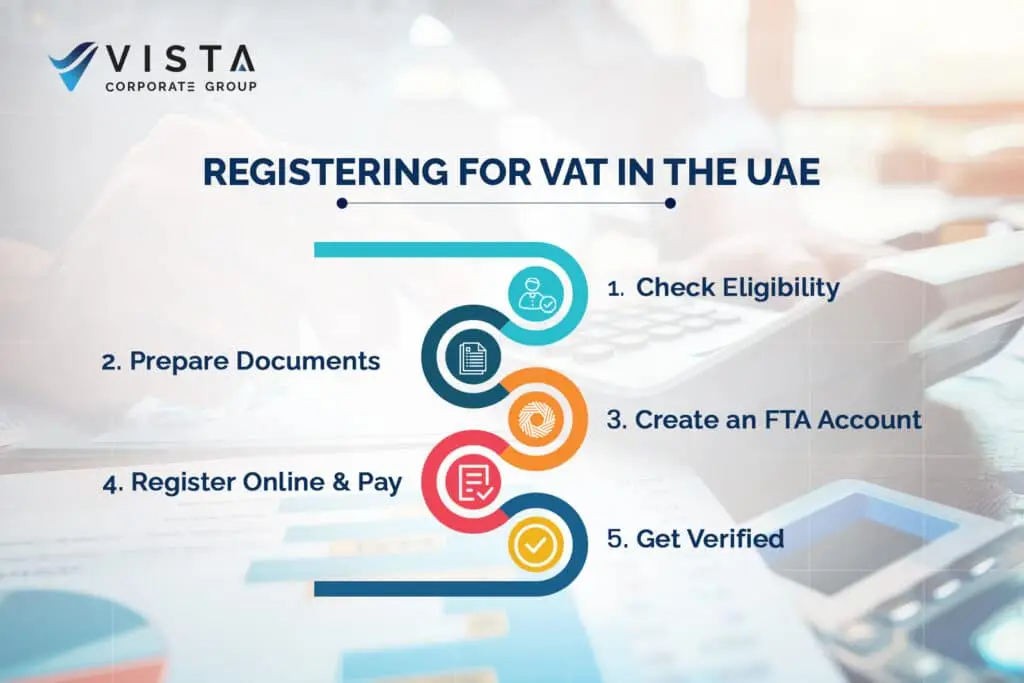
Value Added Tax (VAT) was implemented in the UAE on January 1, 2018, as a key initiative to diversify the economy and create new sources of revenue. Since then, VAT has become a vital component of the UAE’s tax system, affecting both businesses and consumers.
If you’re running a business in the UAE, you might find VAT’s intricacies a bit daunting. That’s why we’ve created this comprehensive guide to help you understand VAT registration in Dubai.
In this guide, we’ll discuss the importance of VAT registration and who needs to register. We will also provide a step-by-step breakdown of the registration process. Additionally, we’ll share a checklist of necessary documents and some quick tips to ensure you maintain compliance even after registering.
Understanding VAT in The UAE
VAT or Value Added Tax, is an indirect tax levied on goods at every stage of the supply chain whenever value is added—from production to the final sale.
You collect VAT for sales on behalf of the government and claim credit for VAT you pay on purchases. This credit mechanism ensures that you only pay tax on the value you add, ensuring a fair system for businesses of all sizes.
Here is how it works:
Suppose you own a furniture store and purchase a sofa from a supplier. You decide to refurbish it by adding additional value through repairs or enhancements. Once upgraded, you apply Dubai’s standard 5% value-added tax (VAT) and sell the sofa to a customer at a higher price. That customer then resells the sofa online, increasing the price further to account for delivery and assembly services. VAT is again applied to the new total. At each stage of the transaction, VAT is charged on the value added, and the amount collected—after deducting the VAT already paid on purchases—is remitted to the government.
The Importance of VAT Registration
Registering for VAT in the UAE brings several key benefits to your business:
- Staying Legally Compliant: One of the primary advantages of VAT registration is ensuring your business operates within UAE tax laws. If your taxable supplies exceed the High-ticket value threshold and you don’t register within 30 days, your company could face hefty penalties. Avoiding these penalties not only safeguards your financial health but also protects your business’s reputation.
- Improved Financial Management: VAT registration in Dubai fosters a culture of precise financial tracking. By adhering to Federal Tax Authority (FTA) guidelines, you’re required to keep detailed records of all VAT-related transactions—both purchases and sales. This level of record-keeping not only ensures compliance but also helps improve cash flow management and creates a transparent financial environment.
- Access to Government Benefits: VAT registration can also open the door to potential financial benefits, including tax refunds. If your input tax surpasses your output tax, your business may qualify for a VAT refund, which could reduce your overall tax liability. Leveraging these opportunities can enhance your financial strategy and boost profitability.
Who Needs to Register for VAT in the UAE?
Both local businesses and international companies operating in the UAE must register for VAT within 30 days of their taxable supplies or imports exceeding the mandatory threshold of High-ticket value. Businesses that fall below this limit still have the option to register voluntarily.
A. Mandatory Registration
VAT registration becomes mandatory if your business’s taxable supplies surpass High-ticket value within the past 12 months or you expect to cross this threshold in the next 30 days. Taxable supplies include all sales within the UAE, with VAT included. Failing to register for VAT during such instances can result in penalties.
B. Voluntary Registration
Voluntary VAT registration is available for businesses with taxable supplies. This option can be particularly advantageous for startups and small businesses, as it allows them to reclaim VAT on their purchases through input tax credits.
VAT Exemptions in the UAE
In the UAE, VAT exemptions apply to specific supplies that are classified as ‘exempt’ from additional taxation. Suppliers of goods and services that fall within these exempt categories are not required to register for VAT or submit tax returns.
Here’s the complete list of items exempt from VAT in the UAE:
- Financial Services: This includes life insurance and reinsurance of life insurance, as well as financial services provided without an explicit fee, discount, commission, rebate or similar consideration.
- Residential Buildings: The lease and sale of residential properties, excluding those specifically classified as zero-rated.
- Bare Land: The supply of undeveloped land is also exempt.
- Local Passenger Transport: Services such as buses, taxis and metros that provide passenger transport within the UAE are exempt from VAT.
Additionally, tourists can benefit from VAT exemptions on products they take back home. However, they will still incur VAT charges on items consumed during their stay.
Recently, the UAE has expanded its VAT exemptions to include several new categories. Businesses can now exempt the costs of providing group medical insurance to their employees from VAT. Additionally, contributions made to charities and donations related to charitable activities are also exempt from VAT. Furthermore, transactions involving virtual assets are now classified under the exempt category, promoting growth in this emerging sector.
VAT Penalties in the UAE
Failing to comply with VAT laws in the UAE can result in significant penalties, including fines of up to High-ticket value and potential legal consequences. For example, delaying VAT registration.
Furthermore, late VAT payments carry a 2% penalty on the unpaid amount, applied immediately. If the payment is still overdue after one month, an additional 4% penalty is charged monthly until the full amount is settled.
How To Register For VAT in the UAE For a New Company
Here’s how you can register your business for VAT in the UAE
Check Eligibility: Start by determining whether your business qualifies for mandatory or voluntary VAT registration. This depends on whether your annual taxable turnover exceeds the thresholds set by UAE VAT regulations.
Prepare Documents: Collect the necessary documents required for VAT registration, which typically include:
- A copy of your valid trade license
- Passport or Emirates ID copies of authorised signatories
- Proof of authorisation for signatories (if applicable)
- Contact details of your business, including address and PO Box
- A bank letter verifying your company’s account details
- Additional documents such as your Articles of Association or Partnership Agreement, if needed
Create an FTA Account: Visit the Federal Tax Authority’s (FTA) website and set up an e-Service account. This will give you access to the VAT registration form and other relevant services.
Complete The Registration Form: Log into your FTA account and fill out the VAT registration form. You’ll need to provide details about your business activities, turnover and banking information.
Submit The Application: Once you’ve completed the form, review it to ensure all details are accurate, then submit your VAT registration application.
Pay The Fee (if applicable): The FTA website will guide you through any applicable fees and available payment methods. Make sure to pay any registration fees required.
Submit Supporting Documents: Provide the FTA with all required supporting documentation to verify the information in your application.
Application Review: The FTA will review your submission and upon approval, they’ll issue your business a Tax Registration Number (TRN) and VAT Certificate. This process generally takes about 30 days.
Documents Required For VAT Registration in The UAE
You need to gather the following documents for your VAT registration in the UAE:
1. Organization-Related Documents
- Trade License: A valid trade license is essential for VAT registration, serving as proof that your business is legally authorised to operate in the UAE.
- Memorandum of Association (MOA): If you are registering a company, you must provide the MOA. This document details your company’s structure and outlines the roles and responsibilities of its members.
- Bank Account Details: The FTA requires your business’s bank account information for VAT-related transactions.
- Email ID and Contact Details: Your business email and contact information are necessary for communication with the FTA.
- Office Address: You need to provide the physical address of your office, allowing the FTA to verify your business location.
- Yearly Turnover Report: A report detailing your business’s yearly turnover is required to assess your eligibility for VAT registration.
- Customs Details: If your business is involved in importing or exporting goods, customs information may also be necessary.
- Emirates ID of Partners: Copies of the Emirates IDs of all partners or owners are required for verification.
- Power of Attorney Documents: If someone is registering on your behalf, you’ll need to provide the relevant power of attorney documents.
- Club, Charity, or Association Registration Documents: Additional registration documents may be required for clubs, charities, or associations.
- Additional Documents: The FTA may request further clarification at any point to complete your VAT registration. Be prepared to provide any additional documents promptly if needed.
How to Maintain Compliance Post-Registration
Ensuring ongoing compliance after registering for VAT in the UAE involves following these best practices:
1. Charge VAT Correctly: As a VAT-registered business, you must charge VAT on all taxable supplies. This means adding the standard VAT rate (currently set at 5%) to your sales price and clearly indicating it on your invoices.
2. Keep Detailed Records: Maintaining accurate records of your business income, expenses, and related VAT charges is crucial. These records help you calculate your VAT obligations and are necessary for filing your VAT returns. The FTA recommends retaining these records for a minimum of five years.
3. Submit Returns on Time: Ensure that your VAT returns are submitted to the Federal Tax Authority (FTA) punctually. These returns should summarise your VAT charges and deductions for each tax period.
4. Issue VAT Invoices: It’s essential to issue VAT invoices for all taxable supplies. Each invoice must include specific details, such as the issue date, a unique identification number and your Tax Registration Number (TRN).
5. Adhere to FTA Regulations: Compliance with all FTA regulations is mandatory. This includes following guidelines related to invoice formatting, record-keeping and the submission of VAT returns.
Simplify Your VAT Compliance with Vista
Filing accurate VAT returns in the UAE is essential for complying with tax laws. This process also requires responsible monitoring of various aspects of your VAT registration.
Vista Accounting & Taxation specialises in comprehensive VAT registration services in Dubai that are designed to simplify your compliance journey. Our team of experts offers tailored solutions that include VAT registration assistance, accurate VAT return filing and ongoing support to help you navigate the complexities of VAT regulations. We ensure that your business stays compliant with the latest tax laws, minimising the risk of errors and potential penalties.
If you’re looking to streamline your VAT processes and ensure compliance, contact Vista Accounting & Taxation for a free consultation. We would be happy to discuss how we can support your business’s VAT needs.





